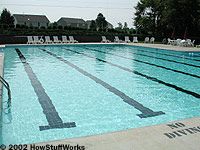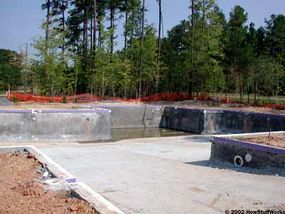Home Improvement

Although swimming pools are essentially just large water basins, they can be a lifesaver on a hot summer day. In reality, there is a lot of advanced technology at play in the average pool.
This article will explore the construction of pools and examine the plumbing system responsible for maintaining clean and chemically-balanced water.
Pool Fundamentals
Swimming pools come in various shapes and sizes, but they all operate on the same basic principles. They rely on a combination of filtration and chemical treatment to constantly cleanse a significant amount of water.

A typical swimming pool comprises seven primary components:
- A water basin
- A motorized pump
- A water filter
- A chemical feeder
- Drains
- Returns
- PVC plastic plumbing to connect all the pieces
The fundamental concept involves continuously pumping water from the pool through the filtration and chemical treatment systems before returning it to the pool. This way, the pumping system ensures that the water in the pool remains relatively free of dirt, debris, and bacteria. Some pools may also have heaters to regulate the water temperature.
The next section will delve into the various types of swimming pools.
FAQ
1. What is a swimming pool?
A swimming pool is a man-made basin filled with water that is used for swimming and other water-based activities. It can be installed either above or below the ground and comes in different shapes and sizes.
2. How do swimming pools work?
Swimming pools work by circulating water through a filtration system. The water is drawn from the pool through a skimmer and pumped through a filter to remove debris and impurities. The clean water is then returned to the pool through a series of jets to keep it circulating and prevent stagnation.
3. What are the different types of swimming pools?
There are several types of swimming pools, including above-ground, in-ground, lap pools, and infinity pools. Each type has its own unique features and benefits.
4. How is a swimming pool maintained?
A swimming pool needs regular maintenance to keep it clean and safe for use. This includes testing the water chemistry, brushing the walls and floor, vacuuming debris, and checking the equipment. A professional pool service can help with maintenance tasks.
5. What is the ideal temperature for a swimming pool?
The ideal temperature for a swimming pool is between 78 and 82 degrees Fahrenheit. This temperature is comfortable for most swimmers and helps prevent hypothermia and other health risks.
6. What are the benefits of swimming?
Swimming is a low-impact exercise that provides a full-body workout. It can improve cardiovascular health, increase strength and endurance, and reduce stress and anxiety.
7. What safety precautions should be taken when using a swimming pool?
Swimming pools can be dangerous if proper safety precautions are not taken. This includes ensuring that the pool is fenced and locked, keeping the area around the pool clear of obstacles, and providing adult supervision for children at all times.
8. How much does it cost to install a swimming pool?
The cost of installing a swimming pool varies depending on the type, size, and location of the pool. It can range from a few thousand dollars for an above-ground pool to tens of thousands of dollars for an in-ground pool.
9. How long does it take to install a swimming pool?
The time it takes to install a swimming pool varies depending on the size and complexity of the project. It can take anywhere from a few days to several weeks to complete the installation process.
10. What is the lifespan of a swimming pool?
The lifespan of a swimming pool depends on several factors, including the quality of the materials used, the level of maintenance, and the climate. With proper care and maintenance, a swimming pool can last for several decades.
11. Can swimming pool water be recycled?
Swimming pool water can be recycled through a process called backwashing. This involves reversing the flow of water through the filtration system to clean it and then returning the water to the pool. This can help conserve water and reduce the cost of pool maintenance.
12. What is the future of swimming pool technology?
The future of swimming pool technology is focused on automation and energy efficiency. This includes smart pool systems that can be controlled through a mobile app, energy-efficient pumps and filters, and solar-powered heaters and lighting.

Brody is a skilled craftsman and gardening expert. From renovating living spaces to cultivating lush gardens, Brody’s knowledge and passion shine through, inspiring readers to embark on their own home improvement and gardening journeys with confidence.






Leave a Reply